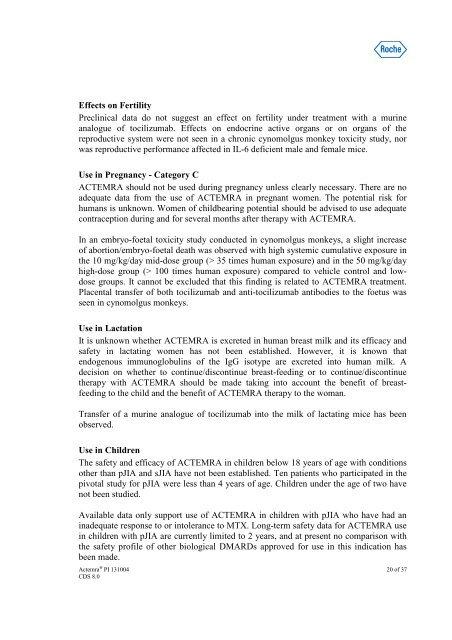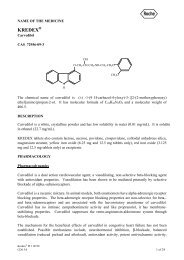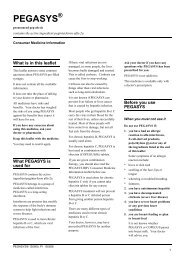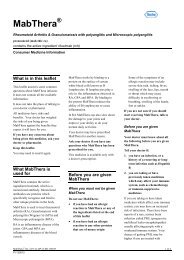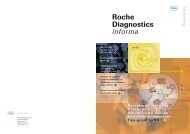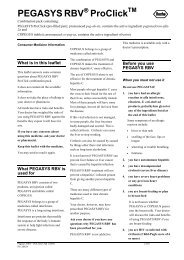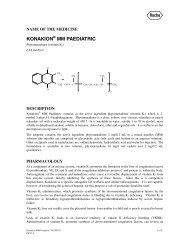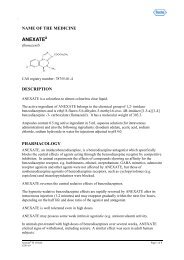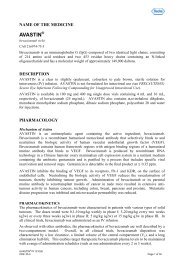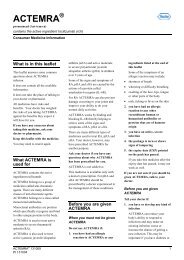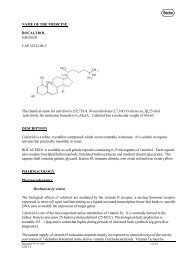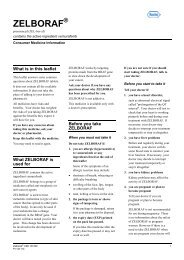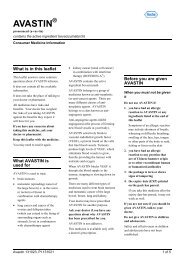Actemra (tocilizumab) Product Information (PI) - Roche Australia
Actemra (tocilizumab) Product Information (PI) - Roche Australia
Actemra (tocilizumab) Product Information (PI) - Roche Australia
You also want an ePaper? Increase the reach of your titles
YUMPU automatically turns print PDFs into web optimized ePapers that Google loves.
Effects on Fertility<br />
Preclinical data do not suggest an effect on fertility under treatment with a murine<br />
analogue of <strong>tocilizumab</strong>. Effects on endocrine active organs or on organs of the<br />
reproductive system were not seen in a chronic cynomolgus monkey toxicity study, nor<br />
was reproductive performance affected in IL-6 deficient male and female mice.<br />
Use in Pregnancy - Category C<br />
ACTEMRA should not be used during pregnancy unless clearly necessary. There are no<br />
adequate data from the use of ACTEMRA in pregnant women. The potential risk for<br />
humans is unknown. Women of childbearing potential should be advised to use adequate<br />
contraception during and for several months after therapy with ACTEMRA.<br />
In an embryo-foetal toxicity study conducted in cynomolgus monkeys, a slight increase<br />
of abortion/embryo-foetal death was observed with high systemic cumulative exposure in<br />
the 10 mg/kg/day mid-dose group (> 35 times human exposure) and in the 50 mg/kg/day<br />
high-dose group (> 100 times human exposure) compared to vehicle control and lowdose<br />
groups. It cannot be excluded that this finding is related to ACTEMRA treatment.<br />
Placental transfer of both <strong>tocilizumab</strong> and anti-<strong>tocilizumab</strong> antibodies to the foetus was<br />
seen in cynomolgus monkeys.<br />
Use in Lactation<br />
It is unknown whether ACTEMRA is excreted in human breast milk and its efficacy and<br />
safety in lactating women has not been established. However, it is known that<br />
endogenous immunoglobulins of the IgG isotype are excreted into human milk. A<br />
decision on whether to continue/discontinue breast-feeding or to continue/discontinue<br />
therapy with ACTEMRA should be made taking into account the benefit of breastfeeding<br />
to the child and the benefit of ACTEMRA therapy to the woman.<br />
Transfer of a murine analogue of <strong>tocilizumab</strong> into the milk of lactating mice has been<br />
observed.<br />
Use in Children<br />
The safety and efficacy of ACTEMRA in children below 18 years of age with conditions<br />
other than pJIA and sJIA have not been established. Ten patients who participated in the<br />
pivotal study for pJIA were less than 4 years of age. Children under the age of two have<br />
not been studied.<br />
Available data only support use of ACTEMRA in children with pJIA who have had an<br />
inadequate response to or intolerance to MTX. Long-term safety data for ACTEMRA use<br />
in children with pJIA are currently limited to 2 years, and at present no comparison with<br />
the safety profile of other biological DMARDs approved for use in this indication has<br />
been made.<br />
<strong>Actemra</strong> ® <strong>PI</strong> 131004 20 of 37<br />
CDS 8.0


